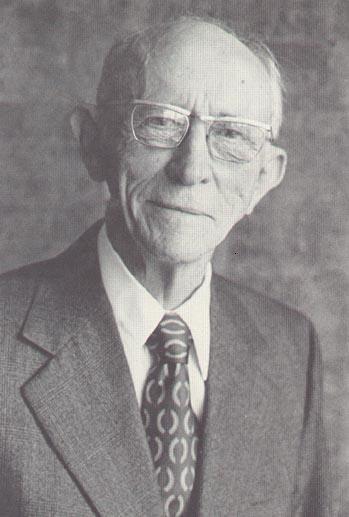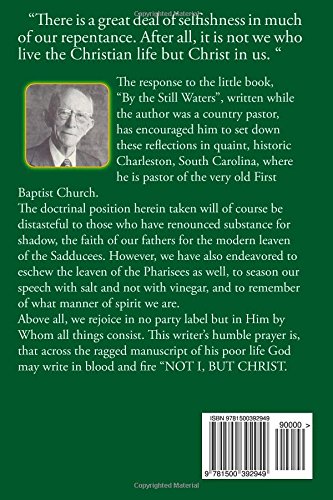Description
CONSIDER HIM
by
VANCE HAVNER
Author of “Road to Revival”
“Secret of Christian Joy” and
“Bythe Still Waters”
Contents
“NOT KNOWING WHITHER… I KNOW WHOM”7
“WE SEE NOT YET … BUT WE SEE JESUS”8
THE BACKSIDE OF THE DESERT. 22
THE BEATITUDE OF THE UNOFFENDED.. 28
THE FAIR KING AND THE FAR COUNTRY. 31
WILL YOU WALK THE WAVES TOWARD JESUS?. 36
THE SUFFICIENT AUTHORITY OF THE WORD.. 50
THE BLESSING OR THE BLESSER?. 51
“GO . . . AND LEARN WHAT THAT MEANETH”53
IS YOUR GRACE DRAWING INTEREST?. 55
“WITH HIM ALSO … ALL THINGS”71
THE INVINCIBLE AFFIRMATION. 71
MARKING TIME OR “MARCHING TO ZION”?. 87
FOREWORD
The response to the little book, “By the Still Waters”, written while the author was a country pastor, has encouraged him to set down these reflections in quaint, historic Charleston, South Carolina, where he is pastor of the very old First Baptist Church.
The doctrinal position herein taken will of course be distasteful to those who have renounced substance for shadow, the faith of our fathers for the modern leaven of the Sadducees. However, we have also endeavored to eschew the leaven of the Pharisees as well, to season our speech with salt and not with vinegar, and to remember of what manner of spirit we are.
Above all, we rejoice in no party label but in Him by Whom all things consist. This writer’s humble prayer is, that across the ragged manuscript of his poor life God may write in blood and fire “NOT I, BUT CHRIST.
Vance Havner.
CONSIDER HIM
“Consider Him…”—Heb. 12: 3.
The eleventh chapter of Hebrews is an impressive roll-call of faith’s heroes but the climax is reached only when we consider Him. It is ever thus. No life is great that does not point to Christ. These great names from Abel through the prophets are but sign-posts that lead at last to Him.
It is so with Scripture. In these pages many verses are called to mind. Start from any of them and the path leads to Him. “They are they which testify of Him.”
So, no matter what the theme or text, we are really considering Him for by Him all Scripture consists. Satan will go to any lengths to keep you from considering the Lord. If he can put you to riding the hobby of a favorite doctrine; if he can get you looking back at yesterday’s failures, or ahead to tomorrow’s dreads, or around at the array of circumstances or within at your own weakness and poverty,— anywhere but looking unto Jesus, then he is satisfied. And remember that fie has many masks and will come so like an angel of light that you are scarcely aware at first that you are not considering Christ.
These pages are written that from many diverse points along the T and O Trail, the Trust and Obey, we might pause a moment and take a fresh look at Him “lest we be wearied and faint in our minds.”
“NOT KNOWING WHITHER… I KNOW WHOM”
(Heb. 11:8; 2 Tim. 1:12)
Abraham went out, not knowing whither he went When God calls us to the adventure of faith, He does not furnish a road-map in advance. We have a “sinking” feeling of having stepped out upon nothing, but then God is always doing wonderful things with nothing: He hangeth the earth upon nothing (Job 26:7), and calleth those things which be not as though they were (Rom. 4:17).
Neither does faith know WHY. Habakkuk wondered: “O Lord . . . WHY?” (1:2, 3). So did Job. God did not give them explanation but revelation, and when they saw God they did not need explanation. When we see WHOM, the WHY does not matter.
Faith does not know WHAT. Peter was concerned about John: “WHAT shall this man do?” Our Lord never explains the WHATS: “WHAT I do thou knowest not now; but thou shalt know hereafter” (John 13: 7).
But one thing faith does know: “I know WHOM I have BELIEVED”. He knows whither, why, what: “He knoweth the way that I take” (Job 23:10). Sight rests upon some THING, some WHERE: faith rests upon SOMEONE . . . anywhere!
“WE SEE NOT YET … BUT WE SEE JESUS”
(Heb. 2:8, 9)
There is so much that we see not yet Sorrow removed? Not yet. Sickness vanquished? Not yet Satan bound? Not yet. Death destroyed? Not yet. But amidst all that we see not yet we see Jesus. And the things we see not yet must never keep us from beholding Him.
We are so given to counting up the Not Yets. The Psalmist enumerates his adversaries,—sin, sickness, backbiters, false friends,—but from desperation he turns to Deity: ‘‘But Thou, O Lord—” (Ps. 41:10). “I may sin BUT THOU—”. “I may be sick BUT THOU—” “Friends may fail BUT THOU—” Jeremiah adds up his miseries in the fifth Lamentation hut he ends gloriously with “Thou, O Lord, remainest”. Micah paints as dreary a picture as the Word records until he arrives at the conquering conclusion: “Therefore I will look unto the Lord” (7:7). And of course there is always Habakkuk with his “although” and “yet” (3:17, 18).
Like a rock in a weary land stands God’s great positive in a world of negatives. It would be a hopeless wilderness of Not Yets were it not for one eternal phrase that makes an eternity of difference: “BUT we see Jesus.”
GOD IN A FRAME
“I will manifest Myself to him”—Jno. 14:21.
A little boy, whose father was away from home most of the time, looked at his dad’s picture on the wall and said to his mother: “Mother, I wish father would come out of that frame.”
Is God real to you, a Person near at hand? Or is He more like a picture on the wall, a motto, a doctrine, something wonderful to look at and think about, but still in a frame? Have you wished He might come out of the frame, become a glorious living Reality? Have you cried, “Oh that I knew where I might find Him?”
Is Jesus in a frame,—lovely, wondrous to think upon, but He stays up on the wall? Sorrow has come, and failure, and pain, and loneliness, and you have wept and prayed, but still He isn’t real, He seems to stay in a frame. And doubt sneers, “Is there anything to it?”
He said He would come out of the frame. “He that hath my commandments, and keepeth them, he it is that loveth me: and he that loveth me shall be loved of my Father, and I will love Him, AND WILL MANIFEST MYSELF TO HIM.” You have His commandments . . . faith in Him and love for one another (1 John 3: 23)… but are you KEEPING THEM? You trust and pray … but have you OBEYED? When you do He will come out of the frame.
WHY ARE YOU SORRY?
“Against Thee, Thee only, have I sinned?” —Vs.51:4.
When you sin and then sorrow in repentance, why are you sorry? Are you sorry because you have been untrue to the Lord and have grieved the Holy Spirit? Or are you sorry merely because YOU have failed, and have not come up to YOUR expectations?
There is a great deal of selfishness in much of our repentance. After all, it is not we who live the Christian life but Christ in us. We should never be looking at self anyway, expecting anything of ourselves. When we fail, if we worry because WE have dropped from our standard, then we have only been trying to live up to a dramatized version of ourselves. It is a common error to be a spiritual poser, even posing like Christ, which of course always ends in collapse and then we are miserable because WE have disappointed OURSELVES. Christ gets little consideration.
David had sinned against almost everybody, himself, his people, Uriah, Bathsheba, but he knew that at heart it was sin against God. While we must afterward make restitution to others wronged, repentance is a transaction solely with God and what matters there is not that WE have failed but that GOD has been disobeyed, Christ denied, the Spirit grieved.







Reviews
There are no reviews yet.